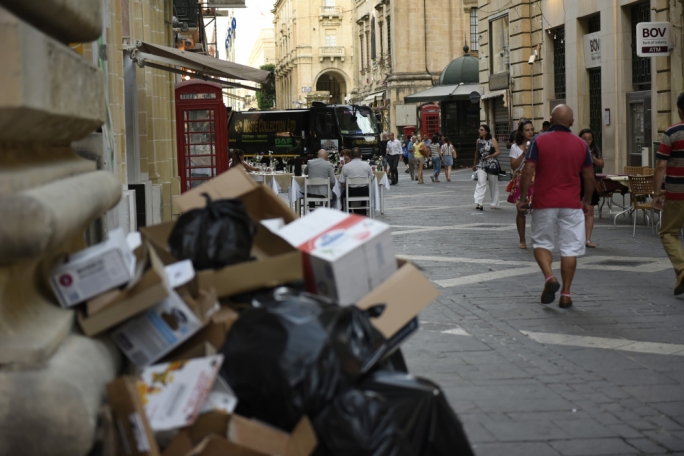World Habitat Day was established in 1985 by the United Nations General Assembly and is commemorated every first Monday of October. Its aim is to focus attention on the state of our towns and cities and to the basic right of all to adequate shelter. It also reminds us that we all have the power and the responsibility to shape the future of our cities and towns.
This year’s theme is Municipal Solid Waste Management, a global issue that affects everyone. The amount of waste produced by individuals is growing daily and often costs local authorities a large proportion of their budget. Poor solid waste collection and disposal can lead to serious health problems, caused by uncontrolled dump sites and waste burning as well as polluted air and water.
A change in public attitudes to minimise waste and stop littering, increased recycling and reusing, sufficient funding and solid waste planning, including adequate landfill sites, can help cities to improve the current state of solid waste management and save money to become ‘waste-wise’.
In 2010, it was estimated that 292 kilos of waste are produced by every person in the world each year.
Compare this to the estimated 483 kilos per capita in the EU member states and a staggering 621 kilos per capita in Malta (Eurostat, 2016). While over 44 per cent of waste is recycled in the EU, less than 10 per cent is recycled in Malta.
These are alarming figures, both because they indicate that the issue of waste is one of the most pressing our country faces today and also as they indicate that, despite a number of nationwide campaigns over the past years, we are still not sufficiently aware of the impact of our individual consumption patterns on this growing problem.
These high levels of waste generation are symptomatic of our ‘throwaway culture’ and, as such, merit a concerted effort by the government to instil changes that can be considered to be significant. The recent announcement that compostable waste will now be collected from households is indeed excellent news, however, this is not enough. We need to look at all other waste streams such as packaging, plastic and household electronic goods as well as issues such as marine litter, to name but a few, if we are truly to achieve any impactful change for the benefit of our society.
Architecture and engineering can contribute greatly to an improved quality of life
UN-Habitat promotes an ‘integrated solid waste management framework’ approach as a solution, which envisages good waste collection services, environmental protection through proper treatment, disposal and resource management as well as cost-effective, affordable and inclusive solutions that also recognise the role of informal and micro-enterprise sectors in achieving high rates of recycling.
Education and awareness activities also have a key role to play and local governments can engage with civil society and advocacy groups to raise public awareness with schools as a possible focus.
The Waste Management Plan for the Maltese islands proposed a strategy for the period 2014-2020. Measures outlined therein have been, or are in the process of being, implemented. Others, however, exist only on paper. It is now high time to review this strategy, to take into account the realities of our current economy, population, consumption patterns, infrastructure stresses and waste disposal sites before we reach a critical point that will take its toll on the quality of life of our citizens.
World Habitat Day is also commemorated by the architectural profession which celebrates World Architecture Day concurrently. In a statement to fellow architects, Thomas Vonier, president of the International Union of Architects, reminds us that “architecture can help our planet face two of its gravest problems – environmental degradation and ever-greater human needs. Architects can help to reverse patterns that destroy heritage, degrade habitat, squander resources and perpetuate social imbalances”.
Architecture and engineering can contribute greatly to an improved quality of life, through the implementation of sustainable development principles.
Being aware of this critical role our profession has in our society is the first step in ensuring that the interventions we carry out today are mindful of their impact on future generations.
I conclude by inviting readers to join the Chamber of Architects and Civil Engineers in celebrating World Habitat Day, World Architecture Day and European Engineers day (on October 5) and to visit the upcoming exhibition of thesis projects by the latest group of Master graduates from the Faculty for the Built Environment.
The exhibition will be open to the public during Notte Bianca on Saturday and will mark the launch of the second edition of the highly successful Premju Emanuele Luigi Galizia, organised by the Chamber of Architects and Civil Engineers.
Simone Vella Lenicker is vice-president of the Chamber of Architects and Civil Engineers and also a speaker for Catholic Voices Malta
This is a Times of Malta print opinion piece Monday, October 1, 2018


